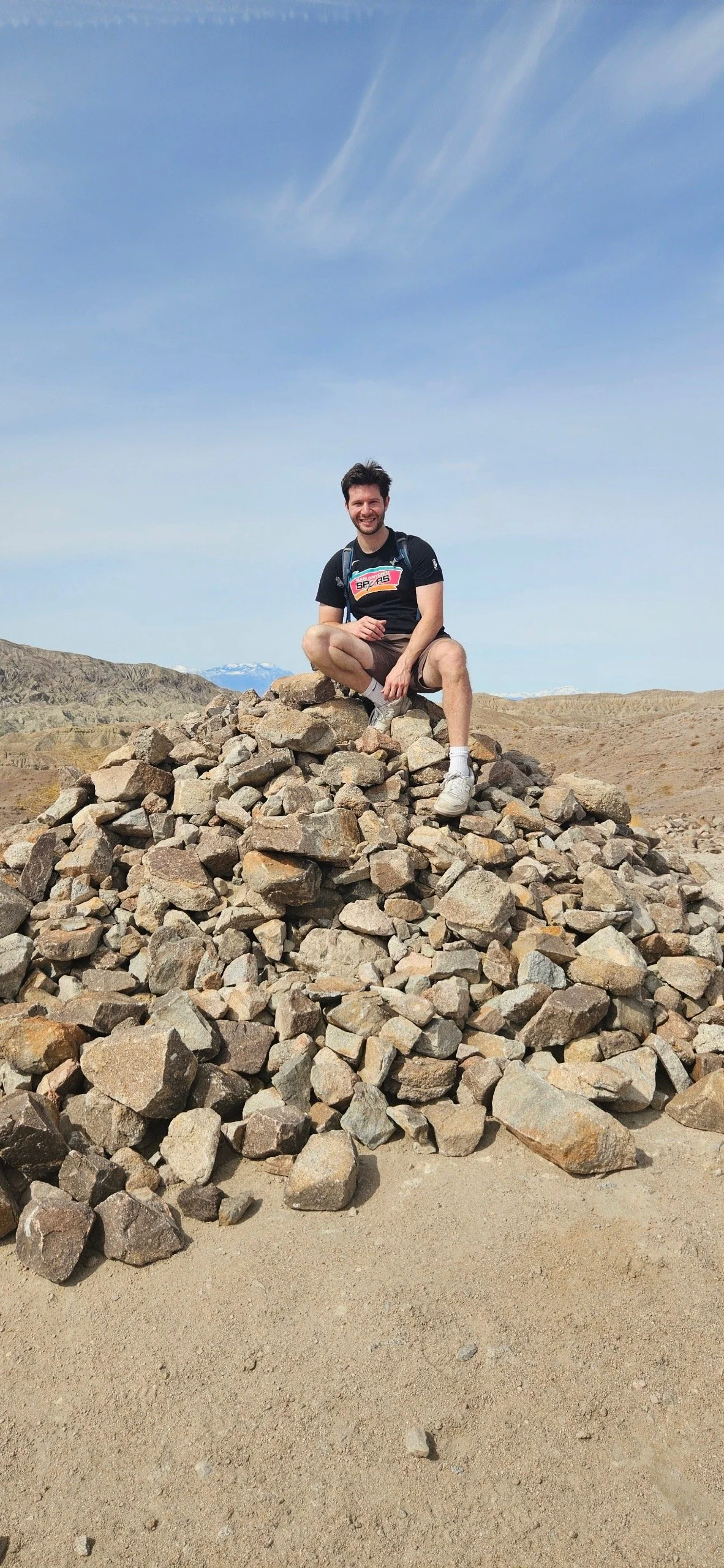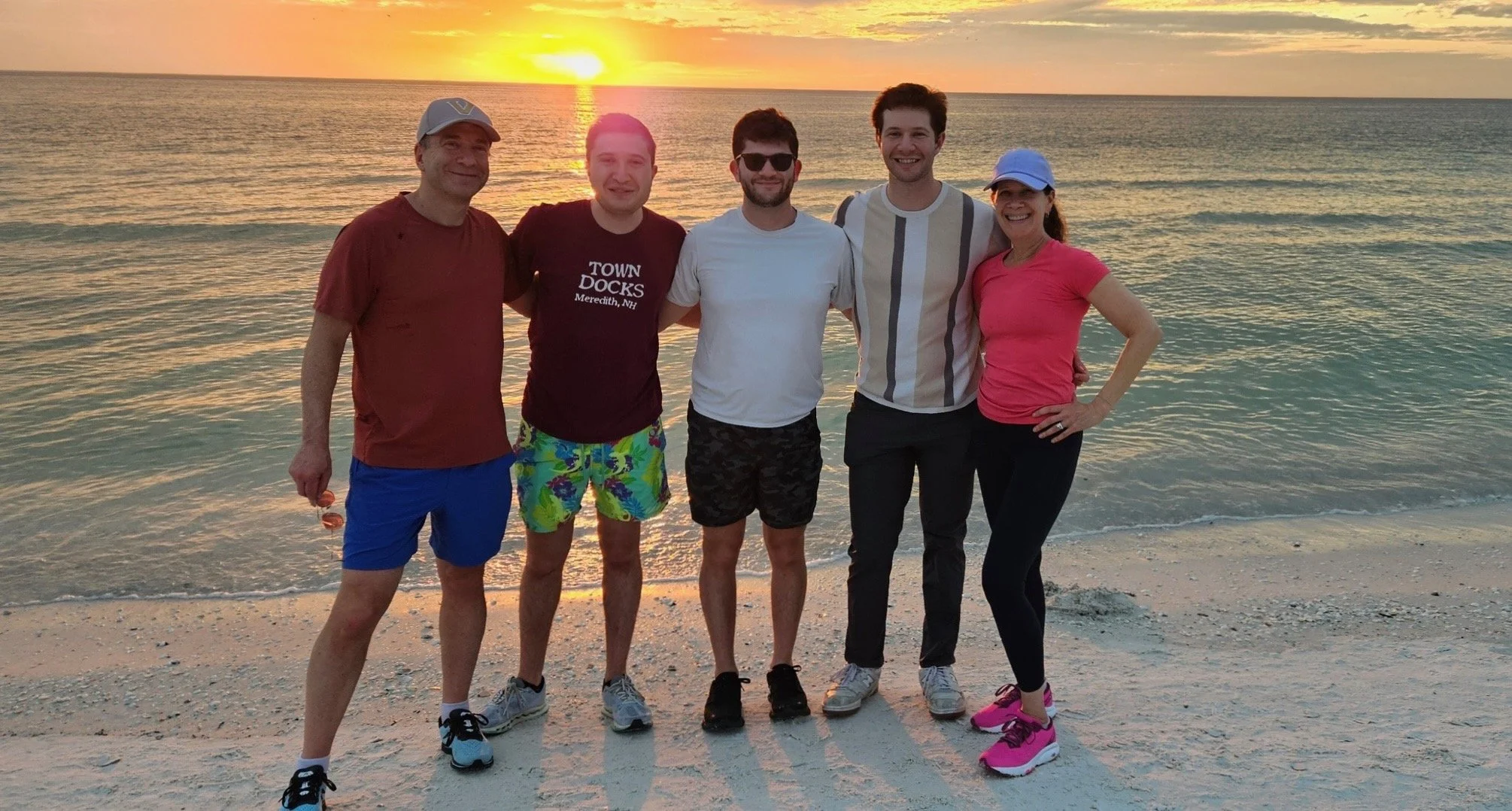The Benefits of Mindfulness: Shari and Matt share their perspectives on mindfulness
Matt was walking a few steps behind me as we approached the elementary school. At this pace, he was going to be late and his fourth grade teacher, Miss Roberts, would not be pleased. Matt, let’s go. Why are you walking so slowly? “I’m fine,” he responded. When I turned around to look at him, he didn’t seem fine. He was walking very slowly and awkwardly. “I’m fine,” he repeated. I slowed down and approached him. He turned to face me, hiding the back part of his body. What’s wrong? “Nothing. I’m fine.” I leaned over to see what he was hiding. That’s when I saw it.
AAAAAAAAhhhhhhhhhhh!!!!!!!!!!!
The backs of Matt’s legs were covered in various shades of pink, purple, and red. The backs of his knees were bumpy and inflamed. Some areas were bleeding. My natural, automatic reaction was to scream. And that reaction was exactly what Matt was trying to prevent by hiding the backs of his legs from me.
Matt had a lifelong history of eczema and I had a history just as long of reacting to his outbreaks by screaming “AAAAAAAhhhhhhhhhh!!!!!!!!!!!!
Needless to say, Matt was not a fan of my habitual reaction.
Now a young adult, Matt lets me know clearly and directly when he doesn’t appreciate my reactions. For example, when Matt is home, we often spend time in the kitchen. He cooks his lunch and I hang out - in other words, hover. Inevitably, I point out something he could be doing differently, in my opinion, more safely or better. After all, the kitchen is my domain, right? When I exclaim, “The flame’s too high!” he shoots me a look to remind me that he is a twenty-six-year-old man who cooks his own meals every day in his own kitchen in a city far away. Somehow, by some modern-day-miracle, he has managed to survive and not burn his food or set the apartment on fire without me intervening.
My other sons, Zach and Justin, also call me out when I forget that they are grown adults living independent lives. I intellectually understand that while they will always be my children, they are no longer children. Nevertheless, my reactions to them are habitual and automatic. Sometimes I experience and respond to them as though they were still in elementary, middle, or high school, even though they are professionally and personally independent adults.
Another great example happened shortly after Justin started his full-time post-college job. He texted me about something that happened at work. I responded, naturally, by giving him advice about the situation. He put me in my place immediately. “I told you for information, not to ask for your advice.” While his delivery may sound a little obnoxious and I certainly felt the sting of his reply, the boundary Justin set for me was appropriate for his age. He wanted to share information about his life on his terms without me second-guessing his decisions or perspectives. That’s a fair ask for a twenty-something year-old employed college graduate.
Justin and I have another issue. When he says something I even partially disagree with, I start my response with an exaggerated “AND.” For example, if he says, “I don’t think I can make it home Saturday night before Mother’s Day, I might respond with, “AND I hope you’ll be home before lunch on Sunday.” Justin hates when I do it. AND I don’t do it on purpose. AND it just kind of flows out of me, automatically and habitually. AND when it does, Justin reacts to me. AND I don’t blame him. He has given me feedback numerous times that he doesn’t like when I speak to him that way. I get it. It’s annoying! If I could catch myself before I said it, I would. Instead, I keep stepping into the same frustrating hole.
How can I avoid stepping into these holes with Zach, Matt and Justin? How can I shift these automatic conversational habits and improve the quality of my relationships with my young adult sons?
As I ponder this Mother’s Day question, my favorite quote from Viktor Frankl comes to mind. “Between stimulus and response there is a space. In that space is our power to choose our response. In our response lies our growth and our freedom.”
Viktor Frankl’s space between stimulus and response, that pause, is where the opportunity to change my automatic reactions resides. In that space, I have the chance to mindfully notice what I’m thinking and feeling and choose my response to my children intentionally and wisely.
What can I do in that space between stimulus and response that will enable me to respond, not from habit, but from conscious choice?
I can practice mindfulness. The practice of mindfulness is not just something you do while sitting quietly in formal meditation. Mindfulness can be used as an approach for experiencing every moment of your life. Mindfulness simply invites you to ask yourself, “What am I aware of that is happening in this moment? What thoughts, feelings, and sensations are arising within me right now?”
Paying attention to all aspects of your immediate experience naturally slows down your stimulus-response process, as you take time to notice all of your thoughts, feelings and body sensations.
This is how you can use mindfulness in the space between stimulus and response:
What am I aware of that is happening in my body right now?
Am I feeling any sensations? Tightness? Constriction? Warmth? Cold? Ache? Pain?
Where am I feeling those sensations?
Am I feeling any emotions? Sadness? Disappointment? Fear? Guilt? Excitement? Impatience?
What am I aware of that is happening in my mind right now? Are any thoughts, beliefs or ideas coming up?
Using mindfulness to become aware of what you are thinking and feeling allows you to be fully present in any given moment. When you are present, you can respond to your situation in the present, here and now, rather than reacting with a habitual remnant from similar past experiences, including from your own childhood.
As Mother’s Day 2025 approaches, I am counting down the days until Matt returns to the east coast from California. After four years of graduate school, he will be starting his internship in New York at the end of July. Until he moves into a place of his own, he will be staying with us at our family home in New Jersey. While I couldn’t be more excited to share the (my) kitchen with him again, I am anticipating another round or two of butting heads in our shared (my) space.
How can I apply mindfulness to this situation?
Let’s say I notice that Matt has (hypothetically, of course) left a trail of raw egg between the mixing bowl and the frying pan.
Between the stimulus (seeing the raw egg) and one of my habitual responses (commenting on the spilled egg, asking him to clean it up when he’s done or going over immediately to clean it myself), I find the space.
I pause.
I notice what is happening inside my mind and my body.
I notice that I am thinking, “Gross! There’s raw egg on the counter. That has to be cleaned up immediately!”
I notice that my body feels activated and agitated.
I notice that I feel impatient and frustrated.
I take it all in, attending to my thoughts and feelings. I give them time and space.
I notice that my wonderful twenty-six year-old son is home with me for a very brief time before he moves on to the next phase of his life.
I feel grateful.
I wait until he finishes cooking and keep him company as he enjoys his meal.
When he’s done, I clean the counter. I mean, adult or not, he still won’t clean it the way I want him to ….
Matt recently shared with me that he started practicing mindfulness meditation. I was very curious to hear his take on the practice, what he is learning and how he finds it helpful personally and with his therapy clients.
Matt’s POV:
I reflect back on my time before practicing mindfulness and try to retroactively understand my resistance. My mom’s story about my eczema reflects her knee-jerk AAAAAAHHHHHHHing, and it also shows a tendency of mine, which is to be unconcerned with problems of my own until they reach a certain threshold. To some extent, this can be seen as being easy-going, a trait I am proud to often embody. However, this reflects a degree of inattentiveness: a failure to evaluate a trait, pattern, sensation, etc. because it hasn’t led to great enough consequences to demand my full attention. I pretty much saved techniques of meditations for times of distress, to calm myself from a strong bout of anger or anxiety, and remained blind, or mindless, to many benefits I now appreciate.
Consistent mindfulness practice has helped me greatly reduce traits in myself that I believed were innate and permanent. A clear example of this was that I viewed myself as an impatient person. Generations of Becker men have identified with this label of impatience, so I viewed it as typical and inevitable. Overall, being impatient was fine. I never lost any friends or jobs or anything important from that feeling or related behaviors. But feelings associated with impatience… stink! My body is extremely uncomfortable in these moments; that is how I start to become aware that I am feeling impatient. Like any unpleasant emotion, behaviors designed to get rid of the unpleasant sensations connected with impatience (rushing people around me, clenching, creating narratives), particularly when done mindlessly, do not help anything and often reinforce unwanted mental, emotional and physical experiences.
Through practicing more consistent mindfulness and learning more about the theory, I can understand the sensations at their most basic level of experience. I identify my narrating brain’s tendency to attribute meaning with thoughts that do not align with my logical beliefs. Can I prevent myself from feeling the initial urge/sensation/wave? Not right now. Can I identify the experience for what it is before believing the underlying narrative that I am in a rush and this obstacle is causing me some problem? Sometimes; it depends. But what I can reliably now do is understand that this sensation and these thoughts represent a pattern, and the initial impression I have of the situation may not align with my real feelings in that moment.
I can also understand that many reactionary behaviors, whether internal or external to myself, only serve to frustrate myself and those around me. Impatience, anger, anxiety, and all emotions serve to tell us something. They are good at their jobs. Mindfulness allows detachment from the thoughts that make these unpleasant emotions linger, letting the sensations associated with the emotions come through and leave like a wave. Emotion orients us to what we need to know. Mindful awareness allows us to not suffer with the unpleasantness of emotion once it's served its purpose. When I feel impatient, I can use mindfulness to notice my experience. Do I need to do something to move quicker? Do I really need to? Is this impatience doing anything other than making my internal experience unpleasant? Are my feelings of impatience helping me move faster? Notice. Feel. Let it pass.
Many people misunderstand traits such as impatience, perfectionism, cynicism and give them too much credit. They feel like a permanent staple in our existence, and often give off the impression that they are responsible for success. A clear example of this would be with my father, who would tell you that his impatience is something he is proud of, as he is never late for anything… a great quality! But impatience doesn’t make you timely, perfectionism doesn’t make you successful, and cynicism doesn’t make you wise. Our values determine our best actions, while traits of impatience, perfectionism, and cynicism are merely side effects that make our lives worse. I have not been late any more often since shifting my relationship with impatience. I leave myself time to get where I need to go through the mindfully-made decision that I want to be on time and don’t like to rush too much. Feeling tense and uncomfortable in the car has never helped anyone’s ETA. If I actually do find myself needing to pick up the pace and am capable of doing so safely and effectively, I am happy to act on that. Mindfulness allows you an opportunity to form a new relationship with your thoughts, feelings and sensations. You don’t lose control by reducing unpleasant traits like impatience, perfectionism and cynicism. Instead, you gain freedom by understanding your ability to choose what is worth following and what is worth letting pass.
I think it is important to identify another aspect of mindfulness/meditation that kept me hesitant to dive in for some years. Hint: It is related to the 50 Buddhas sitting around the Becker house. While I appreciate these figurines and my mom’s connection to them, this association kept meditation practices foreign to me. My deepening relationship with meditation and mindfulness has been completely secular. I have a ton of respect and admiration for Buddhism, its followers and its principles. I recognize the extent to which psychotherapy, which I believe in and practice, is influenced by, and often taken directly from, Eastern Philosophy. Awareness of consciousness and attention to sensation is not rooted in a belief in anything other than that which can be clearly experienced by all. I moved closer to these ideas when I realized that I do not have to identify with any associated religion or spirituality. If it helps my mom with her mindfulness journey, that is great too. I am happy to see them around my home and take them as a reminder to be present to the moment.
My relationship to mindfulness is growing at the same time as I am planning to move back to the NY/NJ area, which has resulted in interesting insights. I have missed being close to where all of my family and most of my friends live, and this has resulted in some difficult emotional times for me during my graduate school years. Following the elation of my successful internship match in New York, I have often found myself in anticipation of leaving San Francisco and returning to the east coast.
I took up mindfulness in part to reduce the frequency and extent of my experiences of emotional suffering, like many do. I saw this as a way to improve my understanding of internal experience and build upon the benefits I have found from CBT in my own life. I had not considered a more positive form of day-dreaming, such as envisioning myself in New York doing all the things I have been excited about for years, as a form of suffering. It often feels good to think this way, as anyone who has day-dreamed of something pleasant can understand. However, day-dreaming of good times to come has the down side of removing me from my present moment. With closer attention to these thought patterns littered with anticipation and day-dreaming, I saw consequences. In those moments I was disconnected from what I was doing, where I was, and who I was with. I felt more pull towards New York and noticed my feelings of frustration with the time between myself and the move. Mindfulness has allowed me to enjoy my time in San Francisco more than ever. The beauty of the Bay Area and the wonderful friends I have made here feel more clear. I am spending more time doing things I care about and less time worrying, day-dreaming, rushing or being otherwise lost in thought. This is the power of attention and awareness. I can be here, in San Francisco, now. The move to New York will come in it’s own time.
I am curious and excited to see how these ideas translate when I move. Spending a few weeks in New Jersey with my parents is always full of chances to practice mindful awareness of emotion. A big move will be full of opportunity and challenge, as distractions will be more present than ever. I would say I can’t wait for the move, but it turns out I can.
Shari / Mom's response:
In reading Matt’s perspective, I am struck by his ability to use the concept of mindfulness to help him navigate his own challenging emotional experiences. I’m sure he is already using mindfulness with his therapy patients as well. I agree with Matt that mindfulness is a life-changer, which is why I include it as the first and foundational resource in my book-in-progress. I’m excited that Matt has started to incorporate a mindful approach into his life at such a young age. That being said, it is never too late! My own Mom (AKA Grandma) started taking my weekly mindfulness-based gentle yoga classes during the pandemic. Several students in my Thursday morning meditation class are in their eighties as well. I am in awe of the human mind, body and spirit to continue to learn, grow and evolve.
Shari / Mom’s POV on mindful parenting:
Raising children is an amazing journey - a miraculous, tumultuous, joyful, painful process. Learning to grow as your children grow is a profound opportunity for gratitude and humility. I truly believe that we are meant to learn from our children. If you listen to your children with open ears, watch with open eyes and feel with an open heart, they will teach you everything you need to know about parenting - and more. If you let them, they will help you see your limitations and your mistakes. Let them. Then show them that we are all human, everyone makes mistakes, no one is perfect, and there is always the chance to do better, to repair and to heal.
To my favorite oldest son, Zach, my favorite middle son, Matt, and my favorite youngest son, Justin, thank you for showing me how I can do better and how I can be better - as a parent and as a person.
I love you and I am so grateful to be your mom.










